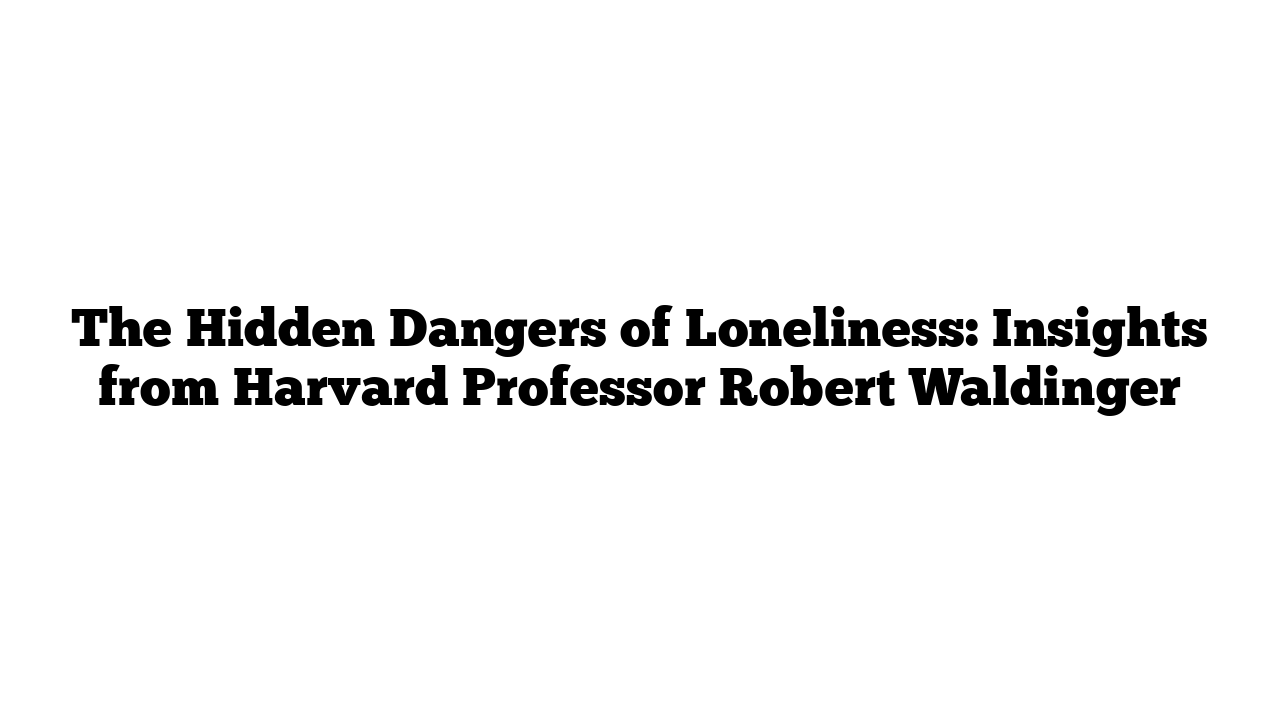Loneliness is becoming a significant epidemic in our society. This issue has been growing for decades, impacting individuals across all demographics. Harvard professor Robert Waldinger sheds light on the nuances of loneliness and its effects on our well-being.
What is Loneliness?
Loneliness is often described as the feeling that “I am less connected to other people than I want to be.” This experience is highly subjective. Unlike isolation, which one can choose and feel fine about, loneliness is a personal experience that can occur even in crowded rooms.
You might feel lonely in a marriage or among friends, while some find joy in solitude, like being on a mountaintop. According to studies, approximately 60% of people report feeling lonely frequently, while the lowest estimates suggest that 30-40% of individuals experience this feeling. Alarmingly, young adults aged 16 to 24 are identified as the loneliest age group. However, loneliness also affects older adults, particularly as they lose friends and partners.
The Loneliness Epidemic
Waldinger emphasizes that loneliness is pervasive, affecting people of all ages and income levels. Several factors contribute to this epidemic:
- Increased Mobility: Since the 1950s, our society has become more mobile. Many people relocate for jobs or education, disrupting their networks of family and friends. While this mobility can offer opportunities, it often leads to a disconnection from our roots and support systems.
- Impact of Television: The introduction of television into American homes led to a decline in community involvement. People started going out less, joining clubs less often, and engaging with their communities more sporadically. This shift diminished our sense of belonging.
- Digital Revolution: The rise of digital technology and social media has further exacerbated feelings of loneliness. With more screens vying for our attention, we often neglect meaningful interactions with the people around us.
Loneliness and Health
Research by Julianne Holt-Lunstad indicates that loneliness can be as harmful to our health as smoking half a pack of cigarettes daily. The stress associated with loneliness is a significant factor in physical health deterioration. Additionally, studies show that lonely individuals experience more rapid brain decline, impacting their cognitive health.
Investing in Relationships
The most effective way to combat loneliness is to invest in relationships. It’s not just about close relationships; even casual encounters—like chatting with the mail carrier or the cashier at the grocery store—play a crucial role in our sense of belonging.
Many lonely individuals may project an image that they do not want to be approached, often out of fear. To overcome this, it is essential to cultivate social skills and create an environment conducive to connection.
Building Connections
Waldinger recommends finding activities or settings where you feel comfortable among others. This approach can lead to meaningful interactions and help you realize that you belong and matter. Remember, the world is full of opportunities to connect.
In addressing loneliness, we must understand its profound impact on our health and well-being. Investing in relationships is vital, not just for ourselves but for fostering a more connected society.
“You are connected. You matter.” These simple truths can guide us in overcoming loneliness and building a supportive community.
For further insights on health and well-being, you can explore articles at medicaltimes.io.
References
- Waldinger, R. (2015). What Makes a Good Life? Lessons from the Longest Study on Happiness. TEDxBeaconStreet.
- Holt-Lunstad, J., Smith, T. B., & Layton, J. B. (2010). Social Relationships and Mortality Risk: A Meta-analytic Review. PLOS Medicine.
By taking these steps, we can combat loneliness and improve our collective health and happiness.
